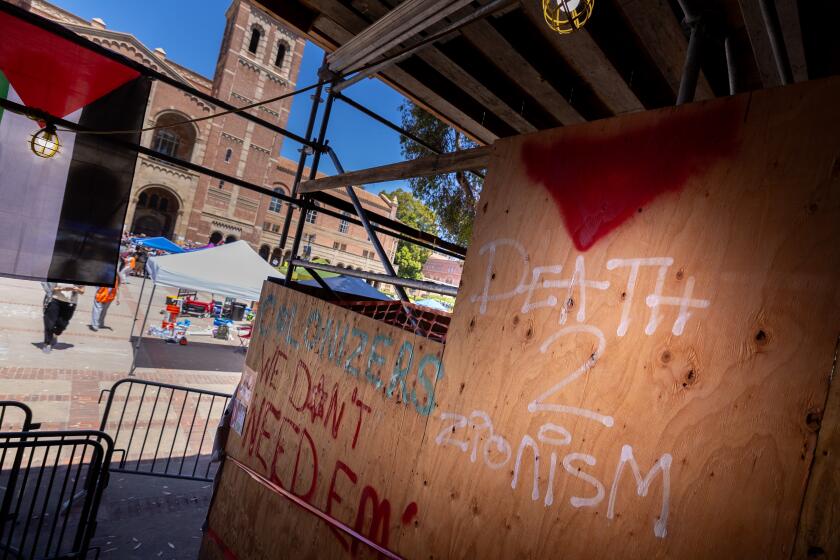What College Life is Really Like
They represent the diversity of college life. One is 58, returning to college after a 40-year break. Another talks frankly about being a recovering alcoholic at 23. A third attended University High in Irvine and lives at home.
The three are among the seven UC Irvine drama students who star in a 26-episode TV series to teach incoming college students how to survive--and even flourish--in their higher-learning experience. The half-hour “Mastering the College Experience” segments are based on the textbook of the same name, and range from overcoming math and science phobias to time management to eating correctly to relationships.
The series, produced by Coastline Community College in Fountain Valley, will be licensed nationwide to colleges, many of which will broadcast them on local PBS stations. Some colleges are expected to use the series for student orientation and even offer course credit for it. The series is expected to run locally on KOCE next fall.
Parts of the series have an MTV “Real World” feel, as the camera follows students into classes, at home and as they travel through their lives. Other segments show them going through some of the exercises in the textbook and discussing how it has helped them through school.
“It was quite enlightening,” Erika Tai, the 20-year-old sophomore who grew up in Irvine, said of the documentary. “I found out a lot about myself in terms of my goals and how to reach them . . . not to be just a better student but a healthier lifestyle.”
The students were picked after responding to a posting at UC Irvine’s drama department. “We wanted to choose people who wouldn’t shy away from the camera, because on a daily basis having a camera in your face could be annoying,” said Steve Marino, the freelance producer-director. “We wanted a nice mix. People who were somewhat gregarious and not too far out in any one direction so that viewers couldn’t identify with them.”
The students ranged from a 19-year-old gay Latino man to the 58-year-old grandmother. “There’s got to be one person within there that a number of people should identify with as going through college experience,” Marino said.
The students were paid $1,300 each. The 300 hours of filming started in February 1999 and ended in December.
“Mastering the College Experience” is the latest production from Coastline’s Coast Telecourses. The program so far has produced about 23 video courses that colleges can license--including those in biology, anthropology and personal finance--and broadcast on TV stations or run at special viewing centers.
The series was funded in part with a $500,000 advance against royalties from Houghton-Mifflin, publisher of the textbook. Thirteen colleges have ordered copies, including Central Wyoming College, Modesto Community College and Clark College in Washington. Coastline expects to turn a profit on the project.
The students in the series were more open than Marino imagined. “But when you’re with someone the amount of time we were with them, they’ll generally crack open,” he said.
Unlike some documentaries, the students could ask that the cameras be turned off when conversations ventured into private areas.
“Sometimes the subjects got a little too close, and I thought they were straying from the focus of being a student,” said senior Steven Parker, 28. “I was open to talk about everything, but I wanted to talk about about how it distracted me from my schoolwork and my studying rather than a session on Steven Parker’s life.”
Karen Jackman, mother of four, grandmother of five, married to Orange County Superior Court Judge James A. Jackman, said that she brought a different perspective to the discussions. And nothing was out of bounds, even the most sensitive subjects like “when we talked about any sorts of addictions or compulsions or obsessions,” she said. “Each of us had our own.”
Jackman dropped out of UCLA 40 years ago but wanted to get her degree. “The age category on the audition notice was 18-65,” she said. “And I’m past my 18th birthday.”
Like most of the other students, Tai is an aspiring actress, and she looked at the project as training for her career.
But she may feel differently when she views it in a few years.
“I’ll probably feel like a dork because it’s a different time in my life, and I’m a different person,” she said. “But I’m sure will be very helpful to other students.”
The complete guide to home viewing
Get Screen Gab for everything about the TV shows and streaming movies everyone’s talking about.
You may occasionally receive promotional content from the Los Angeles Times.




